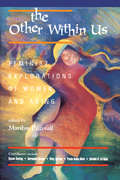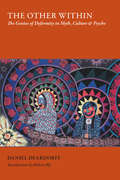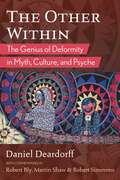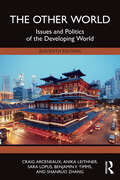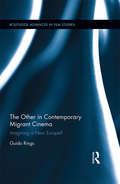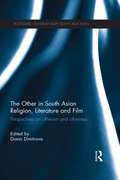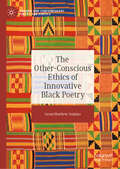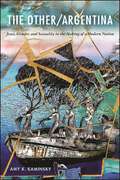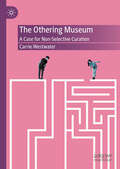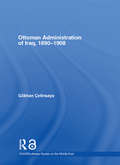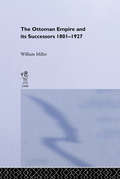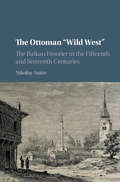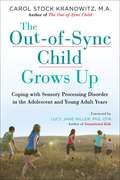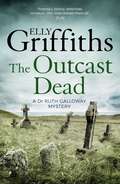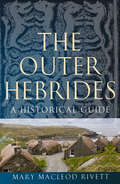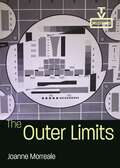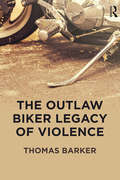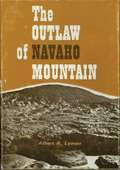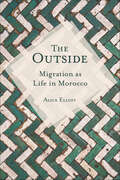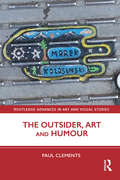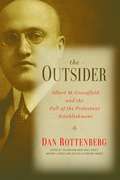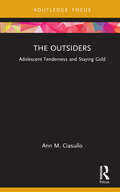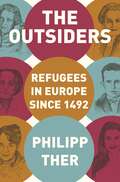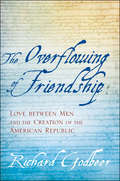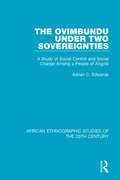- Table View
- List View
The Other Within Us: Feminist Explorations Of Women And Aging
by Marilyn PearsallFeminist women bequeath to us a powerful critique of our society's obsession with beauty and impossible body ideals. Having refused makeup, high heels, and short skirts in their youth, these women are now entering the most stigmatized stage in a woman's life?old age. As she becomes the ?older woman,? the feminist's rejection of beauty standards and her ability to locate self-worth is being challenged.How will feminists respond to the issues raised in this phase of their lives? By confronting the issues unique to older women in our culture and society, these authors redress the neglect and isolation experienced within contemporary feminism and gerontology.Ultimately, the goal of the book is to inspire the aging woman to more easily embrace the ?older other? within her.
The Other Within: The Genius of Deformity in Myth, Culture, and Psyche
by Robert Bly Daniel DeardorffDaniel Deardorff knows otherness firsthand. This highly regarded “singer” in the old sense of that word—musician, storyteller, maker of ritual—had polio as an infant and has used a wheelchair most of his life, giving him a lived perspective that deeply informs his views on this subject. In The Other Within, Deardorff starts with a radical notion: to disclose the blessings of outsiderhood, the many gifts and insights contributed to culture by the marginalized and outcast. Unlike studies that stress the plight of the outsider, this one asserts that to be cast down and out of the consensus-worldview affords a difficult yet significant opportunity: to encounter oneself, not as defined by society but as one actually is. An eloquent spokesman for “the man or woman on the weird road,” Deardorff presents dozens of powerful examples from myth and literature to illustrate his message in a richly allusive, complex series of essays. Drawing on the work of mythologians, poets, psychologists, and scholars, The Other Within takes readers on an initiatory journey, uncovering the roots of human identity and imagination and offering insights–including “trickster wisdom”—revealing the mythic underpinnings of everyday life. This second edition includes updated text, a new introduction, and a helpful glossary.
The Other Within: The Genius of Deformity in Myth, Culture, and Psyche
by Daniel Deardorff• Shows how myths contain medicine to restore wholeness amidst trauma, exile, sudden life change, disability, illness, death, or grief• Synthesizes lessons from shamanic practice, quantum physics, alchemy, soul poetry, wildness, social justice, and the author&’s lived experience• Discloses the blessings of outsiderhood and the gifts and insights gained and contributed to culture by those who are marginalized and outcastThere is an &“other&” that lives within each of us, an exiled part that carries wisdom needed for ourselves and the culture at large. Having survived disabling polio as an infant, Daniel Deardorff knows the oppressions of exclusion and outsiderhood. He guides readers on an initiatory journey through ancient myth, literature, and personal revelation to discover our own true identity. These 10,000-year-old stories contain sacred medicine with insights that release imagination and restore wholeness amid trauma, exile, climate chaos, disability, illness, death, and grief. Illustrating how archetypal figures of the Other--the Trickster, Daimon, Not-I, etc.--hold paradox, Deardorff teaches us to reframe disparities of self/other, civilization/ wilderness, form/deformity and transform the experience of being outcast. Synthesizing lessons from shamanic practice, quantum physics, alchemy, social justice, and his own lived experience, Deardorff affirms the disruptive and transgressive forces that break through dogma, conventionality, and prejudice. He discloses blessings of outsiderhood and gifts to culture by those who are marginalized. Through mythmaking (mythopoesis), the experience of Otherness--cultural, racial, religious, sexual, physiognomic--becomes one of empowerment, a catalyst for human liberation.
The Other World: Issues and Politics of the Developing World
by Anika Leithner Benjamin F. Timms Craig Arceneaux Sara Lopus Shanruo ZhangNow in its eleventh edition, The Other World combines thematic and area studies approaches to explore contemporary global issues. Accessible and interdisciplinary, this textbook offers political, economic, social, and historical analyses of Latin America, Sub-Saharan Africa, North Africa and the Middle East, and Asia. The Other World highlights similarities and differences as it recognizes the challenges and opportunities offered by globalization.New to the eleventh edition: A new co-author, Sara Lopus, whose academic training at the intersection of social, agricultural, and environmental problems enhances the interdisciplinary appeal of the book. A new concluding chapter on Other World features in Western countries and postcolonialism. Revamped sections on “Perspectives on Globalization,” with cases on creative responses to sustainability, sovereignty, and cultural change issues. Discussion of new topics including cybersecurity and cyberwarfare, the impact of supply chain bottlenecks, food politics and issues of global obesity, the rise of zoonotic diseases and pandemics such as Covid-19, new regional diplomacy in Middle East, protest and political change in Latin America, refugee flows, the emergence of ageing populations, and many more. The Other World is the perfect introductory text to the world’s developing regions and their political challenges – a must buy for courses in comparative politics, politics of the developing world; and introduction to international studies.
The Other in Contemporary Migrant Cinema: Imagining a New Europe? (Routledge Advances in Film Studies #46)
by Guido RingsAs a rapidly aging continent, Europe increasingly depends on the successful integration of migrants. Unfortunately, contemporary political and media discourses observe and frequently also support the development of nationalist, eurosceptic and xenophobic reactions to immigration and growing multiethnicity. Confronting this trend, European cinema has developed and disseminated new transcultural and postcolonial alternatives that might help to improve integration and community cohesion in Europe, and this book investigates these alternatives in order to identify examples of good practices that can enhance European stability. While the cinematic spectrum is as wide and open as most notions of Europeanness, the films examined share a fundamental interest in the Other. In this qualitative film analysis approach, particular consideration is given to British, French, German, and Spanish productions, and a comparison of multiethnic conviviality in Chicano cinema.
The Other in South Asian Religion, Literature and Film: Perspectives on Otherism and Otherness (Routledge Contemporary South Asia Series)
by Diana DimitrovaThis book introduces the term "otherism" and looks at the discourse of otherism and the issue of otherness in South Asian religion, literature and film. It examines cultural questions related to the human condition of being the "other," of the process of "othering" and of the representation of "otherness" and its religious, cultural and ideological implications. The book applies the perspectives of ideological criticism, theories of hybridity, orientalism, nationalism, and gender and queer studies to gain new insights into the literature, film and culture of South Asia. It looks at the different ways of interpreting "otherness" today. The book goes on to analyze the ideological implications of the creation of "otherness" with regard to religious and cultural identity and the legitimation of power, as well as how the representation of "otherness" reflects the power structures of contemporary societies in South Asia. Offering a well-thought-out reflection on important cultural questions as well as a deep insight into the study of religion and "otherness" in South Asian literature and film, this book is a pioneering project that is of interest to scholars of South Asian Studies and South Asian religions, literatures and cultures.
The Other-Conscious Ethics of Innovative Black Poetry (Modern and Contemporary Poetry and Poetics)
by Grant Matthew JenkinsThis monograph identifies and investigates the ‘other-conscious’ ethics in black avant-garde poetry since the 1980s. Drawing on a long tradition in the African Diaspora of ethical writings that put the Other first, this work shows how black poets writing in an avant garde or experimental vein in the United States push language to its limits to reveal how poetry can address and exemplify ethical postures towards other people. This other-centered vantage allows the poets to incisively comment on some of this period’s most pressing ethical issues, including postcolonial and racialized violence, the history of slavery and segregation in America, and the expansion of human consciousness. The writers involved in this study include Nathaniel Mackey, Erica Hunt, Will Alexander, Harryette Mullen, and Mark McMorris.
The Other/Argentina: Jews, Gender, and Sexuality in the Making of a Modern Nation (SUNY Press Open Access)
by Amy K. KaminskyThe Other/Argentina looks at literature, film, and the visual arts to examine the threads of Jewishness that create patterns of meaning within the fabric of Argentine self-representation. A multiethnic yet deeply Roman Catholic country, Argentina has worked mightily to fashion itself as a modern nation. In so doing, it has grappled with the paradox of Jewishness, emblematic both of modernity and of the lingering traces of the premodern. By the same token, Jewishness is woven into, but also other to, Argentineity. Consequently, books, movies, and art that reflect on Jewishness play a significant role in shaping Argentina's cultural landscape. In the process they necessarily inscribe, and sometimes confound, norms of gender and sexuality.Just as Jewishness seeps into Argentina, Argentina's history, politics, and culture mark Jewishness and alter its meaning. The feminized body of the Jewish male, for example, is deeply rooted in Western tradition; but the stigmatized body of the Jewish prostitute and the lacerated body of the Jewish torture victim acquire particular significance in Argentina. Furthermore, Argentina's iconic Jewish figures include not only the peddler and the scholar, but also the Jewish gaucho and the urban mobster, troubling conventional readings of Jewish masculinity.As it searches for threads of Jewishness, richly imbued with the complexities of gender and sexuality, The Other/Argentina explores the patterns those threads weave, however overtly or subtly, into the fabric of Argentine national meaning, especially at such critical moments in Argentine history as the period of massive state-sponsored immigration, the rise of labor and anarchist movements, the Perón era, and the 1976–83 dictatorship. In arguing that Jewishness is an essential element of Argentina's self-fashioning as a modern nation, the book shifts the focus in Latin American Jewish studies from Jewish identity to the meaning of Jewishness for the nation.This book is freely available in an open access edition thanks to the National Endowment for the Humanities Fellowships Open Book Program—a limited competition designed to make outstanding humanities books available to a wide audience. Learn more at the Fellowships Open Book Program website at: https://www.neh.gov/grants/odh/FOBP, and access the book online at the SUNY Open Access Repository at http://hdl.handle.net/20.500.12648/1711.
The Othering Museum: A Case for Non-Selective Curation
by Carrie WestwaterThe term “othering” refers to a persistent Us and Them dynamic between museums and their participating public. To reframe this historically paternalistic subject-positioning, over the last decade or so many museums have made firm attempts to address this by attempting to move from being “providers” of engagements to facilitating access to cultural right by embedding co-curatorial techniques and participation. Through the analysis of three co-curated participatory case studies, this book examines how power performs in co-curatorial museum practice. It discusses how it is not just how the participatory process is enacted that is necessary to create this shift to a more socially just profile, but systemic pressures of vulnerability and responsibility found in the political economy of the museum and its participants. This book will chart how this dynamic performs in museums when working with different groups of people, such as volunteers, community participants, and professional artists, presented with differing levels of co-curatorial decision making. The book further investigates whether performances of power are relational to who the participants are, how the processes of participation are constructed, and where the participation takes place, what language is used when conducting these relationships and what the funded institutional responsibilities do to the co-curators (the community and museum staff) when traditional co-curation and co-curation in transition to non-selective curation is applied. Grounding this discussion is the development of this test method of non-selective curation which further illuminates some of these challenges and aims to successfully mitigate them through a radically open and inclusive approach to co-curation.
The Ottoman Administration of Iraq, 1890-1908 (SOAS/Routledge Studies on the Middle East)
by Gökhan ÇetinsayaThis is a study of the nature of Ottoman administration under Sultan Abdulhamid and the effects of this on the three provinces that were to form the modern state of Iraq. The author provides a general commentary on the late Ottoman provincial administration and a comprehensive picture of the nature of its interaction with provincial society. In drawing on sources of the Ottoman archives, bringing together and analyzing an abundance of complex documents, this book is a fascinating contribution to the field of Middle Eastern studies.
The Ottoman Empire and Its Successors, 1801-1927
by William MillerFirst Published in 1966. Routledge is an imprint of Taylor & Francis, an informa company.
The Ottoman “Wild West”: The Balkan Frontier in the Fifteenth and Sixteenth Centuries
by Nikolay AntovIn the late fifteenth century, the north-eastern Balkans were under-populated and under-institutionalized. Yet, by the end of the following century, the regions of Deliorman and Gerlovo were home to one of the largest Muslim populations in southeast Europe. Nikolay Antov sheds fresh light on the mechanics of Islamization along the Ottoman frontier, and presents an instructive case study of the 'indigenization' of Islam - the process through which Islam, in its diverse doctrinal and socio-cultural manifestations, became part of a distinct regional landscape. Simultaneously, Antov uses a wide array of administrative, narrative-literary, and legal sources, exploring the perspectives of both the imperial center and regional actors in urban, rural, and nomadic settings, to trace the transformation of the Ottoman polity from a frontier principality into a centralized empire. Contributing to the further understanding of Balkan Islam, state formation and empire building, this unique text will appeal to those studying Ottoman, Balkan, and Islamic world history.
The Out-of-Sync Child Grows Up: Coping with Sensory Processing Disorder in the Adolescent and Young Adult Years (The Out-of-Sync Child Series)
by Carol Kranowitz Lucy Jane MillerThe long-awaited follow-up to the million-copy bestseller The Out-of-Sync Child, presenting information and advice for tweens, teens, and young adults living with Sensory Processing Disorder, and their parents. The Out-of-Sync Child Grows Up will be the new bible for the vast audience of parents whose children, already diagnosed with Sensory Processing Disorder, are entering the adolescent, tween, and teen years, as well as those who do not yet have a diagnosis and are struggling to meet the challenges of daily life. This book picks up where The Out-of-Sync Child left off, offering practical advice on living with SPD, covering everyday challenges as well as the social and emotional issues that many young people with SPD face. Topics include strategies for coping with the sensory aspects of grooming, social lives and dating, playing sports and music, and other issues, as well as how to find support and help from loved ones, occupational therapy, and other resources. Carol Kranowitz's insights are supplemented by first-person accounts of adolescents and teens with SPD, sharing their experiences and hard-won lessons with readers and adding a powerful personal dimension to the book.From the Trade Paperback edition.
The Outcast Dead: The Dr Ruth Galloway Mysteries 6 (The Dr Ruth Galloway Mysteries #6)
by Elly GriffithsHistorical crimes involving a Victorian child killer may hold the key to several contemporary deaths in this macabre outing for Dr Ruth Galloway, forensic archaeologist. 'Told with a deepening sense of the unease, seasoned with a touch of the occult' Daily MailRuth has excavated a body from the grounds of Norwich Castle, which was once a prison. The body may be that of Victorian murderess Jemima Green. Called Mother Hook for her claw-like hand, Jemima was hanged for the murder of five children. DCI Harry Nelson has no time for long-ago killers. Investigating the case of three infants found dead, one after the other, in their King's Lynn home, he's convinced that their mother is responsible. Then a child goes missing. Could the abduction be linked to the long-dead Mother Hook? Ruth is pulled into the case, and back towards Nelson.
The Outer Hebrides: A Historical Guide
by Mary MacLeod RivettThe Outer Hebrides lie 40 miles to the west of mainland Scotland, forming a barrier to the North Atlantic. Culturally distinct from early prehistory, the islands contain a wealth of historical and archaeological monuments, including the standing stones at Callanish, the magnificent St Clement’s church at Rodel as well as numerous brochs, castles, Pitish houses, croft houses and industrial and military buildings. In addition to descriptions of key historic sites from prehistory onwards and gazetteers covering every place of historical interest, this book also traces the development of the modern environment and landscape of the islands, enabling the visitor to appreciate the sites within their historical and cultural context.
The Outer Limits (TV Milestones Series)
by Joanne MorrealeIn this TV Milestone, author Joanne Morreale highlights the differences of The Outer Limits (ABC 1963–65) from typical programs on the air in the 1960s. Morreale argues that the show provides insight into changes in the television industry as writers turned to genre fiction—in this case, a hybrid of science fiction and horror—to provide veiled social commentary. The show illustrates the tension between networks who wanted mainstream entertainment and the independent writer-producers, Leslie Stevens and Joseph Stefano, who wanted to use the medium to challenge viewers. In five chapters, The Outer Limitsmakes a case for the show’s deployment of gothic melodrama and science fiction tropes, unique televisual characteristics, and creative adaptation of many cultural sources to interrogate the relationship between humans and technology in a way that continues to influence contemporary debate in such shows as Star Trek, The X-Files, and Black Mirror. Underlying the arguments is the eerie notion of The Outer Limits as a disruptive force on television at the time, purposely making audiences uncomfortable. For example, in its iconic opening credit sequence a disembodied "Control Voice" claims to be taking over the television as images mimic signal interference. Other themes convey Cold War paranoia, ambivalence about the Kennedy era "New Frontier," and anxiety about the burgeoning military-industrial-governmental complex. The book points out that The Outer Limits presaged what came to be known as "quality" television. While most episodes followed the lowbrow tradition of televised science fiction by adapting previously published stories and films, the series elevated the genre by rearticulating it through themes and images drawn from myth, literature, and the art film. The Outer Limits is lucid yet accessible, well researched and argued, with enlightening discussions of specific episodes even as it gives attention to broader television history and theory. It will be of special interest to scholars and students of television and media studies, as well as fans of science fiction.
The Outlaw Biker Legacy of Violence
by Thomas BarkerOutlaw bikers represent a very small percentage of motorcycle riders who join motorcycle clubs, but they receive disproportionate attention due to their mystique, unconventional behavior, and violence. Although the outlaw biker phenomenon started in the United States, it has since spread throughout the world. The involvement of Outlaw Motorcycle Gangs (OMGs) in organized crime at the local, regional, national, and transnational levels fosters violence that puts innocent persons at risk for death or injury and leads to the demonization of “bikers” and the overcriminalization of motorcycle enthusiasts and club members. The Outlaw Biker Legacy of Violence, written by internationally known expert Thomas Barker, addresses the legacy of violence in the outlaw biker culture and tackles the implications of the violence that progressed as outlaw biker clubs evolved into adult criminal gangs engaged in crimes for profit over long periods of time and across borders. Beginning with a history of outlaw bikers and the construction of the “folk devil” of the biker, the book outlines the distinctions between conventional motorcycle clubs, Outlaw Motorcycle Clubs, and Outlaw Motorcycle Gangs, and then traces the expansion of these groups across the globe. This book will be relevant to those interested in the examination or investigation of biker gangs in particular or organized criminal groups in general. It is essential reading for criminal justice students and others studying social groups, gangs, and organizations, or the sociology of deviance, and is also relevant for law enforcement professionals dealing with these organizations
The Outlaw of Navaho Mountain
by Albert R. LymanTells the story of Paiute Indian Sowagerie (Posey) from birth to death. Based on historic people and events in San Juan County, Utah, abt. 1860 - 1923. Novel focuses primarily on Sowagerie's earlier life and upbringing around Bluff and concludes with the "Posey War" near Blanding.Additional significant characters include Poke, Toorah, Big-Mouth Mike, Pahneab, and other Paiute Indians and the Navajo Indians Tsabekiss and Bitseel.
The Outside: Migration as Life in Morocco (Public Cultures Of The Middle East And North Africa Ser.)
by Alice ElliotWhat does migration look like from the inside out? In The Outside, Alice Elliot decenters conventional approaches to migration by focusing on places of departure rather than arrival and rethinks migration from the perspective of those who have not (yet) left. Through an intimate ethnography of towns and villages notorious in Morocco for their striking emigration to "the outside," Elliot traces the powerful ways migration permeates life: as brutal bureaucratic machinery administering hope and despair, as intimate force crisscrossing kinship relations and bonds of love and care, as imaginative horizon of the self and of the future. Challenging dominant understandings of migration and their deadly consequences by centering non-migrants' sharp theorizations and intimate experiences of "the outside," Elliot recasts migration as a deeply relational entity, and attends to the ethnographic, conceptual, and political imagination required by the constitutive relationship between migration and life.
The Outsider, Art and Humour (Routledge Advances in Art and Visual Studies)
by Paul ClementsThis cross-disciplinary book, situated on the periphery of culture, employs humour to better comprehend the arts, the outsider and exclusion, illuminating the ever-changing social landscape, the vagaries of taste and limits of political correctness. Each chapter deals with specific themes and approaches – from the construct of outsider and complexity of humour, to Outsider Art and spaces – using various theoretical and analytical methods. Paul Clements draws on humour, especially from visual arts and culture (and to a lesser extent literature, film, music and performance), as a tool of ridicule, amongst other discourses, employed by the powerful but also as a weapon to satirize them. These ambiguous representations vary depending on context, often assimilated then reinterpreted in a game of authenticity that is poignant in a world of facsimile and 'fake news'. The humour styles of a range of artists are highlighted to reveal the fluidity and diversity of meaning which challenges expectations and at its best offers resistance and, crucially, a voice for the marginal. This book will be of particular interest to scholars in art history, cultural studies, fine art, humour studies and visual culture.
The Outsider: Albert M. Greenfield and the Fall of the Protestant Establishment
by Dan Rottenberg"Albert M. Greenfield (1887-1967), an ambitious immigrant outsider, was courted for his business acumen by mayors, senators, governors, and presidents, including Franklin Roosevelt and Harry Truman. As this feisty Russian Jew built a business empire that encompassed real estate, stores (including Bonwit Teller and Tiffany's), hotels (including the Ben Franklin and the Bellevue-Stratford), banks, newspapers, transportation companies, and even the Loft Candy Corporation, he challenged the entrenched business elite. Greenfield was also instrumental in bringing both major political conventions to Philadelphia in 1948. In The Outsider, veteran journalist and best-selling author Dan Rottenberg deftly chronicles the astonishing rises, falls, and countless reinventions of this savvy businessman. Greenfield's power allowed him to cross social, religious, and ethnic boundaries with impunity. He alarmed Philadelphia's conservative business and social leaders-Christians and Jews alike-some of whom plotted his downfall. In this engaging account of Greenfield's fascinating life, Rottenberg demonstrates the extent to which one uniquely brilliant and energetic man pushed the boundaries of society's limitations on individual potential. The Outsider provides a microcosmic look at three twentieth-century upheavals: the rise of Jews as a crucial American business force, the decline of America's Protestant establishment, and the transformation of American cities"--
The Outsiders: Adolescent Tenderness and Staying Gold (Cinema and Youth Cultures)
by Ann M. CiasulloThis volume traces the unique trajectory of The Outsiders, from beloved book to beloved movie. Based on S.E. Hinton’s landmark novel, Coppola’s film adaptation tells the story of the Greasers, a gang of working-class boys yearning for security, love, and acceptance in a world ruled by their rival gang, the rich Socs. The Outsiders: Adolescent Tenderness and Staying Gold explores the cultural impact of Hinton’s book, the process by which Coppola made the film, the film’s melodramatic components, the marketing of the movie to a young female audience, and the nostalgia industry that has emerged around it in recent decades, thereby illuminating how The Outsiders stands apart from other teen films of the 1980s. In its depiction of the emotional rather than sexual lives of young men on film and its recognition of the desires of teen girls as an audience, The Outsiders distinguishes itself from the standard teen fare of the era. With seriousness and sincerity, Coppola’s film captures the essence of the oft-repeated, timeless message of the story: ‘Stay gold.’ This volume engages with a wide range of disciplinary approaches—film studies, gender studies, and literary and cultural studies—in order to distinguish The Outsiders as the significant contribution to youth culture that it was in the early 1980s and continues to be in the twenty-first century. The book fills a gap in existing scholarship on youth culture and is ideal for scholars, students, and teachers in youth cultures, young adult literature, film studies, cultural studies, and gender studies.
The Outsiders: Refugees in Europe since 1492
by Philipp TherThe history of Europe as a continent of refugeesEuropean history has been permeated with refugees. The Outsiders chronicles every major refugee movement since 1492, when the Catholic rulers of Spain set in motion the first mass flight and expulsion in modern European history. Philipp Ther provides needed perspective on today’s “refugee crisis,” demonstrating how Europe has taken in far greater numbers of refugees in earlier periods of its history, in wartime as well as peacetime. His sweeping narrative crosses the Mediterranean and the Atlantic, taking readers from the Middle East to the shores of America.In this compelling book, Ther examines the major causes of mass flight, from religious intolerance and ethnic cleansing to political persecution and war. He describes the perils and traumas of flight and explains why refugees and asylum seekers have been welcomed in some periods—such as during the Cold War—and why they are rejected in times such as our own. He also examines the afterlives of the refugees in the receiving countries, which almost always benefited from admitting them. Tracing the lengthy routes of the refugees, he reconceptualizes Europe as a unit of geography and historiography. Turning to the history of refugees in the United States, Ther also discusses the anti-refugee politics of the Trump administration, explaining why they are un-American and bad for the country.By setting mass flight against fifteen biographical case studies, and drawing on his subjects’ experiences, itineraries, and personal convictions, Ther puts a human face on a global phenomenon that concerns all of us.
The Overflowing of Friendship: Love between Men and the Creation of the American Republic
by Richard GodbeerWhen eighteenth-century American men described "with a swelling of the heart" their friendships with other men, addressing them as "lovely boy" and "dearly beloved," celebrating the "ardent affection" that knit their hearts in "indissoluble bonds of fraternal love," their families, neighbors, and acquaintances would have been neither surprised nor disturbed. Richard Godbeer’s groundbreaking new book examines loving and sentimental friendships among men in the colonial and revolutionary periods. Inspired in part by the eighteenth-century culture of sensibility and in part by religious models, these relationships were not only important to the personal happiness of those involved but also had broader social, religious, and political significance. Godbeer shows that in the aftermath of Independence, patriots drafted a central place for male friendship in their social and political blueprint for the new republic. American revolutionaries stressed the importance of the family in the era of self-government, reimagining it in ways appropriate to a new and democratized era. They thus shifted attention away from patriarchal authority to a more egalitarian model of brotherly collaboration. In striving to explore the inner emotional lives of early Americans, Godbeer succeeds in presenting an entirely fresh perspective on the personal relationships and political structures of the period.Scholars have long recognized the importance of same-sex friendships among women, but this is the first book to examine the broad significance ascribed to loving friendships among men during this formative period of American history. Using an array of personal and public writings, The Overflowing of Friendship will transform our understanding of early American manhood as well as challenge us to reconsider the ways we think about gender in this period.
The Ovimbundu Under Two Sovereignties: A Study of Social Control and Social Change Among a People of Angola
by Adrian C. EdwardsOriginally published in 1962, this study discusses the changes in the life of the Ovimbundu from the time of their caravan trade in slaves, rubber, and ivory down to the more recent period when the organization of their chiefdoms was influenced by the Catholic missions, Portuguese administration and wage labour.
